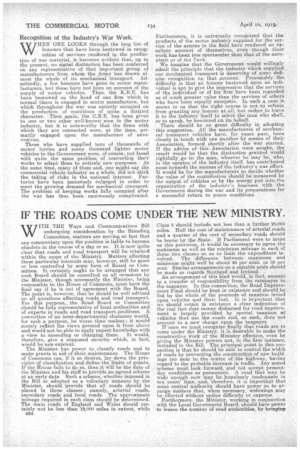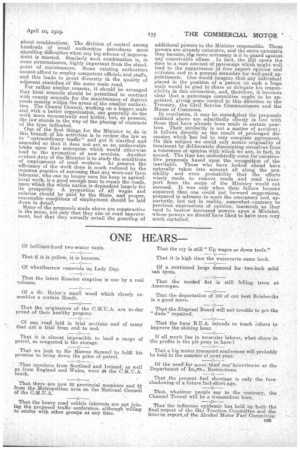IF THE ROADS COME UNDER THE NEW MINISTRY.
Page 2

Page 3

If you've noticed an error in this article please click here to report it so we can fix it.
WITH THE Ways and Communications Bill undergoing consideration by the Standing Committee, matters are moving so fast that any commentary upon the position is liable to become obsolete in the course of a day or so. It is now quite clear that roads and road transport will be retained within the scope of the Ministry. Matters affecting these particular interests may, however, still be more or less controlled by some form of Board or Committee. It certainly ought to be arranged that any such Board should be consulted on all occasions by the Minister, though necessarily the Minister, being responsible to the liouse of Commons, must have the final say if he isout of agreerhent with the Board. The point is, however, that he should be well advised on all questions affecting roads and road transport. For this purpose,, the Read Board or Committee should be fully representative of local authorities and of experts in roads and road transport problems. A committee of an inter-departmental character would, for such a purpose, be worse than useless ; it would merely reflect the views pressed upon it from above and would not be able to apply expert knowledge with a view to amending or changing them. It would, therefore, give a supposed security which, in fact, would be non-existent.
The Minister has power to classify roads and to make grants in aid of their maintenance. The House of Commons can, if it so desires, lay down the principles of classification and define the limits of grants. IF the House fails to do so, then it will be the duty of the Minister and his staff to provide an agreed scheme at an early date. Such a scheme, whether imposed in the Bill or adopted as a voluntary measure by the Minister, should 'provide that all roads should be placed in three classes ; namely, arterial roads, secondary roads and local roads. The approximate mileage required in each class should be determined. The main roads of England and Wales should certainly not be less than 12,000 miles in extent, while E24 , Class 2 should include not less than a further 20,000 miles. Half the cost of maintenance of arterial reads and a quarter of the cost of secondary roads should be borne by the State. If Parliament were to insist on this provision, it wcaild be necessary to agree the makimum as well as the minimum mileage in each of these two classes so as to limit the expenditure involved. The difference between maximum and minimum might well be about 25 per cent. or 30 per cent. Similar arrangements on a suitable scale should be made as regards Scotland and Ireland. An arrangement -of this kind would, in fact, amount to a transfer of responsibility from the ratepayer to the taxpayer. In this connection, the Road Improvement Fund should be kept in existence and should be fed by the whole of the proceeds of taxation levied. upon vehicles and their fuel. it is important that we Should retain in existence a clear indication of the real fact that money disbursed for road improvement is largely provided by special, taxation tf vehicles that use the roads and, as such, does not amount to a new chargeupon the taxpayer.
If once we must recognize finally that roads are to come under the Ministry, it is desirable to make the constructive work of the Ministry effective, even by giving the Minister powers not, in the first instance, included in the Bill. The principal point in this connection is that he should be able to control the width of roads by preventing the construction of new buildings too near to the centre of the highway, having regard to the probable increase in traffic. Any sound scheme must look forward, and ncit accept presentday conditions as permanent. •A road that may be wide enough now may be hopelessly inadequate in ten years' time, and, therefore, it is important that some central authority should have power so to arrange matters that, when necessary, widenings may be effected without undue difficulty or expense.
Furthermore. the Minister, working in conjunction with the Local Government Board, should have power to lessen the number of road authorities, by bringing about combinations. The division of control among hundreds of small authorities intreduces most appalling difficulties when any big scheme of improvement is mooted. Similarly such combination is, in some circumstances, highly important from the standpoint of maintenance. Some existing authorities cannot afford to employ competent officiaL and staffs, and this leads to great diversity in the quality of adjacent stRetches a the same main road.
For rather similar reasons, it should be arranged that local councils should be permitted to contract with county councils for the maintenance of district roads coming witbin the areas of the smaller authorities. The County Council, working on a bigger scale and with a better organization, can generally do' the work more economically and better, but, at present, the law stands in the way of the placing of contracts of the type indicated. One of the first things for the Minister to do in this 'branch of his activities is to review -the law as to "extraordinary traffic" and get it clarified and amended so that it does not act as an. undesirable brake upon that enterprise which would otherwise lead to the promotion of new services. Another evident duty of the Minister is to study the conditions of employment of road workers. At present the efficiency of the work done is much reduced by the common practice of assuming that any worn-out farm labourer, who can no longer earn hiskeep in agricultural work, is a good enough man to repair the roads, upon which the whole nation is dependent largely for its prosperity. A proportion of all wages and salaries should be paid by the State, and proper, reasonable conlitions of eniployment should be laid down in detail.
Many of the proposals made above are constructive in the sense, not only that they aim at road improvement. but that they actually entail the granting of additional powers to the Minister responsible. These powers are already extensive, and the more extensive they become, tlig more necessary is it to guard against any conceivable abuse. In fact, the Bill opens the door to a vast amount of patronage which might well lead to the suppression of free expert opinion and criticism, and to a general scramble for well-paid appointments. One would imagine that any individual placed in the position of a patron on such a huge scale would be glad to share or delegate his respellslaty in this connection, and, therefore, it becomes clear that a patronage committee ought to be appointed, giving some control in this direction to the Treasury, the Civil Service Commissioners and the House of Commons.
In conclusion, it may be stateds.that the proposals outlined above are admittedly cTosely in -line with those that have already i been made in certain quarters. Their similarity s not a matter of. accident; it follows directly as the result of prolonged discussion which 'has led to very complete agreement. On this subject we could only secure originality of treatment by deliberately dissociating ourselves from a consensus of opinion with -which we are, in fact, in accord. The time has undoubtedly come for constructive proposals based upon the recognition of the inevitable. Those who have looked ahead have -naturally taken into account all along the possibility and even probability that the efforts wisely made to remove roads and road transport from the scope of the Ministry would not succeed. It was only when their failure became apparent that one could put forward suggestions, prepared in advance to meet the emergency and apparently, but not in reality, somewhat contrary tas previous expressions of opinion,inasmuch as they tend to bestow increased powers upon a Minister, whose powers we should have liked to have seen very much curtailed.






















